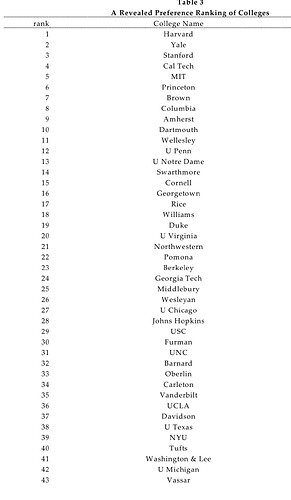Obviously we are all making a lot of working assumptions, and Chicago is notoriously lacking in transparency as to what is actually happening with ED. That said, the kids I have encountered, while not a random sampling, actually track fairly well the sorts of kids we know generally are more likely to apply ED.
Again we don’t know the actual numbers for Chicago–they refuse to fill in those lines on the CDS–but at many colleges the ED pool has gotten quite large.
Generally, all the highly selective private colleges I know about have processes in place to do a thorough, multi-step review of the kids that are at least superficially competitive for admissions. So I see no reason to assume a kid who is in fact a good fit for Chicago will not have their essays read in RD, their recommendations read, their transcript gone over carefully, and so on.
The difference is really just that they have not applied binding. And if it were true that people only applied binding if they had thoughtfully considered all the detailed pros and cons of the college and determined it was actually the best fit for them as an individual, that might be a somewhat useful signal, although of course Chicago would want to form its own opinion on that.
But we know that at a minimum, it is not that for at least many kids. We don’t know how much “signal” and how much “noise” there is exactly in the Chicago ED pool, although again the tactics they are using will predictably increase the noise to signal ratio. But in any event, once that “noise” effect has happened, then Chicago really has no choice but to reevaluate those applicants in the same way it would have to if there was no such “signal”.
So I actually do not believe an applicant choosing to ED is a meaningful aid to Chicago in determining whether that applicant is in substance a good fit for what Chicago might be looking for. I think it just is what it is–it binds the applicant to yield if Chicago choose to admit them.
I would not put it exactly that way. Rather as I suggested before, I think Chicago wants its admits to yield, but in recent history has likely really struggled to yield all the admits it wants unless they can bind them in advance with ED.
And then I think relying on pushing as many kids as possible to ED, including by encouraging kids and parents to believe it will give them a “boost” if they apply ED, is likely changing the composition of the student mix. Whether that is reducing the “quality” of the student mix is a very subjective question.
It is not, but I do think a relevant background understanding is that a few decades ago, like say when I was applying in the late 1980s, applications per applicant were a lot lower, and a lot of applicants applied to very few if any colleges outside of their state or perhaps region. Of course some schools were more “national” than others even back then, but even the more “national” schools had a lot of regionalism evident in their application mix.
But since then, there has been an increasing nationalization of applications, associated with an increase in applications per applicant, particularly among the sorts of applicants most likely to be interested in the “top” “national” private colleges, and the few public colleges with OOS programs that compete for such applicants.
A lot of this is just technology-related. The Internet has made it increasingly easy for people to do detailed research of colleges far away, and indeed the interactive version of the Internet has made it easy for them to get peer reviews, share tips, and so on. This forum is a great example–there was no equivalent way to find out about all these great college options back when I was applying.
And of course the Common App has also made it much easier to apply to many colleges generally, which can include colleges outside your region.
Anyway, what this means is really every famous private college like Chicago has gotten more and more applications from outside its state/region, but also more and more of their applicants are applying to competing colleges outside their state/region.
The point I was making before is you can see in that revealed preference list how this has been problematic for Chicago in particular. Again, there are just so many different types of colleges that are beating Chicago on that list, which is how it ends up so low on the national ranking. And again, even more telling, it ends up below that same sort of mix even in the regional ranking.
So normally it isn’t going to be clear whether this nationalization trend helps or hurts a given college on net–they get more competitive applicants, but they are going up against more competing colleges, which way does it net out?
But in Chicago’s case, that revealed preference data at least suggests nationalization may have been problematic for Chicago on net, because of how many different sorts of colleges nationally are effective competitors against Chicago.
Or, in other words, it was bad enough back in the day when Chicago was losing intellectual kids to Yale because Yale sounded more fun. But now it is also losing them to Rice? To Wesleyan? There are just too many colleges nationally that have that “intellectual but more fun” sort of branding.
Or maybe not, but it would certainly help explain why Chicago in particular has seen the need to so aggressively push ED.
